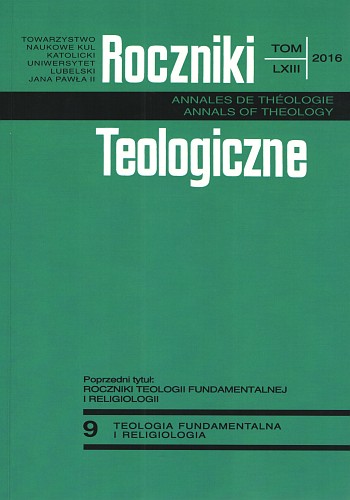Problem relatywizowania pojęć w Daisetza Teitaro Suzukiego anglojęzycznym opisie zenu
The Relativization of the Notions in Daisetzu Teitaro Suzuki’s Description of Zen in English
Author(s): Mariusz RuckiSubject(s): Christian Theology and Religion, Theology and Religion, Systematic Theology
Published by: Towarzystwo Naukowe KUL & Katolicki Uniwersytet Lubelski Jana Pawła II
Keywords: zen; Suzuki; religion; spirituality; faith; soul; notion
Summary/Abstract: This article claims that the Western notions of religion, spirituality, faith and soul are originally reinterpreted by D.T. Suzuki. In this respect his work is a perfect example of the problem of relativization of the religious notions, which is specific to religious comparative studies. The relativization, which consist of shifting the meanings of the designations, goes in three directions in Suzuki’s texts. First, he uses the terms in their metaphorical senses. Secondly, he uses them in relation to zen in a very general and unclear manner. However, in these cases they seem to be reminiscent of their original shape. Thirdly, Suzuki gives new meaning to Western ideas by linking them, directly or indirectly, with the main problem of zen and Buddhism, which is called ignorance. Suzuki interprets ignorance in an epistemological frame as a false knowledge based on differentiation. The zen practice aims to overcome this kind of knowledge and zen goal (satori) is a realization of this overcoming. For Suzuki, religion and spirituality are closely connected to the problem of the Buddhist ignorance. Initially, religion means awareness of the differentiation drama and the will to overcome it. Then religion is the liberation from ignorance and the fruits which this liberation brings. Spirituality is also an aspect of the fight against ignorance. Everything that concerns overcoming of the knowledge based on differentiation is spiritual. Suzuki calls spirituality wisdom which does not distinguish. Suzuki also interprets the terms “faith” and “soul” in relation to the drama of ignorance or differentiation knowledge. He uses these terms in multiple and varied ways. This article shows that the relativization of the religious notions can be a grave weak point in religious studies. When Suzuki states that zen is a religion or spirituality, he understands these terms in the context of ignorance and overcoming ignorance.
Journal: Roczniki Teologiczne
- Issue Year: 63/2016
- Issue No: 09
- Page Range: 125-142
- Page Count: 18
- Language: Polish

